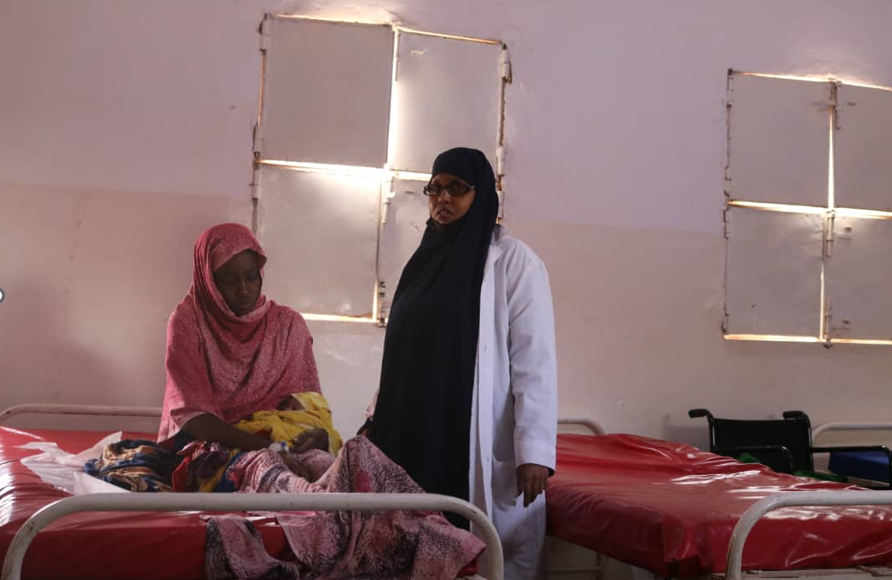 As Muslimo (who changed her real name because of some issues) entered the final weeks of her pregnancy, complications began to emerge. Her labor pains started unexpectedly, and as hours turned into a day, it became clear that her labor was not progressing normally. The traditional birth attendant recognized the signs of prolonged labor and the potential risks to both Muslimo and her unborn child.
As Muslimo (who changed her real name because of some issues) entered the final weeks of her pregnancy, complications began to emerge. Her labor pains started unexpectedly, and as hours turned into a day, it became clear that her labor was not progressing normally. The traditional birth attendant recognized the signs of prolonged labor and the potential risks to both Muslimo and her unborn child.
As Muslimo (changed her real name) entered the final weeks of her pregnancy, complications began to emerge. Her labor pains started unexpectedly, and as hours turned into a day, it became clear that her labor was not progressing normally. The traditional birth attendant recognized the signs of prolonged labor and the potential risks to both Muslimo and her unborn child.
Muslimo’s family made the difficult decision to transport her to the nearest health facility, located over 100 kilometers away in the town of Baidoa. With no ambulance or reliable transportation, they relied on a makeshift stretcher and the assistance of neighbors to carry her across the rough terrain. The journey was grueling, taking them through dusty paths and across dry roads under the scorching sun.
After several hours, the group finally reached Bayhaaw General hospital in Baidoa on May 18, 2024, exhausted and anxious. The medical staff immediately took Muslimo into their care. The midwives quickly assessed the situation and confirmed that Muslimo was experiencing obstructed labor, a life-threatening condition that required immediate intervention.
The maternity unit of Bayhaaw General hospital, supported by UNFPA, was well equipped to handle such emergencies. The staff, including skilled midwives and nurses, sprang into action. They administered medication to manage Muslimo’s pain and stabilize her condition. Recognizing the urgency, they prepared for an emergency cesarean section.
After what felt like an eternity to Muslimo’s family, the team successfully delivered a healthy baby girl. Muslimo’s relief was palpable as she held her newborn daughter for the first time. She received reassurance that both she and her baby were safe and in good health. The complications had been severe, but the timely medical intervention had saved their lives.
In the days that followed, Muslimo received postnatal care at the health center. The staff educated her on newborn care and provided her with nutritional support to aid her recovery. Muslimo’s family expressed their profound gratitude to the medical team and Bayhaaw hospital for their life-saving efforts.
Muslimo’s story is a testament to the importance of accessible healthcare and the impact of well-equipped health centers in remote areas. Her experience highlights the critical role that organizations like UNFPA play in strengthening the RH system and ensuring that even the most vulnerable populations receive the care they need.
Muslimo has currently decided to return to her village with her newborn daughter. She has promised to become an advocate for maternal health in her community, sharing her story and encouraging other women to seek medical care during pregnancy.
Muslimo’s triumphant delivery, despite all challenges, serves as a poignant reminder of the resilience and strength of mothers worldwide, as well as the life-saving impact of accessible healthcare.
Summary
Muslimo, a pregnant woman who changed her real name due to issues, experienced unexpected labor pains and potential risks during her final weeks of pregnancy. Her family had to transport her to the nearest health facility in Baidoa, where she was diagnosed with obstructed labor, a life-threatening condition. The medical staff at Bayhaaw General Hospital, supported by UNFPA, administered medication and prepared for an emergency cesarean section. After a long journey, the team successfully delivered a healthy baby girl, ensuring her and her baby were safe and in good health. Muslimo’s family expressed gratitude to the medical team and Bayhaaw hospital for their life-saving efforts. Her story highlights the importance of accessible healthcare and the role of organizations like SAMA and UNFPA in strengthening the reproductive health system. Muslimo plans to return to her village with her newborn daughter and become an advocate for maternal health.
